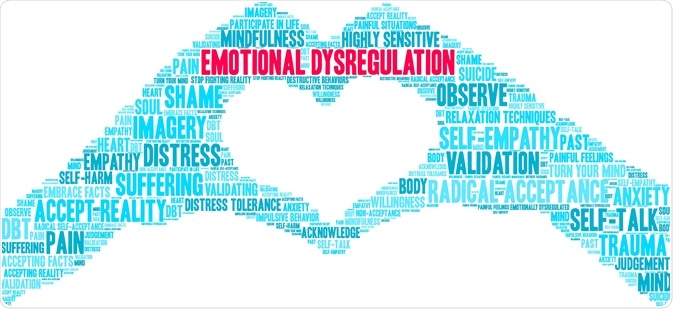Emotional dysregulation refers to difficulty in managing emotions or in keeping them in check. These may also be thought of as mood swings or labile moods. It can involve experiencing intense emotions such as sadness, irritability, frustration, or anger that are comparatively more heightened than expected, relative to the situation that triggered them.

Image Credit: arloo/Shutterstock.com
What is emotional dysregulation?
Emotion dysregulation involves difficulties with negative affective states e.g., sadness and anger.
Emotional dysregulation might affect children or adults. Adolescents may be particularly at risk due to this developmental period in a person’s life being recognizably a time of increased stress due to puberty and peer context. Although it is a common perception that children learn to manage their emotions as they grow up, for some effectively managing emotions continues to be problematic well into adulthood.
Those with emotional dysregulation might not easily recognize their own emotions and can become confused or guilty about emotions experienced such that behavior is not readily controlled and decision making becomes a challenge.
Experiencing intense emotions can lead to situations in which a sufferer is unable to calm down easily. People with emotional dysregulation might try to avoid difficult emotions and when experiencing them they can easily become impulsive. Another example is that those with emotional dysregulation might be overly negative. As a result, there is a risk for:
- Anxiety
- Depression
- Substance abuse
- Suicidal thoughts
- Self-harm
Other symptoms include high-risk sexual behaviors, extreme perfectionism, and eating disorders.
In children emotional dysregulation exhibits itself through temper tantrums, crying, and refusing to talk or to make eye contact.
Over time the condition may interfere with the quality of life leading to interpersonal problems, issues at home and work, or, in the case of children, at school.
Causes of emotional dysregulation
Scientists believe that in the experience of emotional dysregulation there is a problem with the emotional braking mechanism in the brain caused by a reduction in the response of certain neurotransmitters. This leads an individual to experience an ongoing “fight or flight” response whereby the pre-frontal cortex shuts down in times of heightened stress.
There a several possible reasons why a person may develop this condition and it is often co-morbid with another larger mental health problem (see below). Possible causes are:
1. Child neglect
In the case of neglect, there is a failure on the part of the caregiver to cater to the basic needs of the child. Here the caregiver does not provide adequate levels of physical and or emotional care.
2. Early childhood trauma
Whereby traumatic events are experienced early on in life during the critical period of a child’s development.
3. Traumatic brain injury
Brain dysfunction is caused by a dramatic blow to the head, for example.
4. Chronic invalidation
When a person’s thoughts and feelings are repeatedly ignored, rejected, or else judged.
Co-morbidities: Disorders related to emotion dysregulation
Constructs of emotion dysregulation are pivotal to our contemporary understanding of several psychopathologies.
- ADHD
A condition that affects behavior and comprises symptoms such as inattentiveness, short attention span, hyperactivity, and impulsiveness
- Personality Disorders such as borderline personality disorder (BPD)
BPD affects perceptual abilities in the way you think and feel about yourself and others and sufferers experience greater levels of emotional sensitivity and reactivity
- Bipolar II
A disorder involving periods of depression and periods of elevated mood
- Alcohol Use Disorder (AUD)
A pattern of alcohol use that involves problem drinking and preoccupation with alcohol
- Autistic Spectrum Disorder (ASD)
A group of developmental disabilities that cause significant social, communication, and behavioral differences
- Post-Traumatic Stress Disorder (PTSD)
A mental health condition caused by a traumatic event where symptoms include flashbacks, nightmares, anxiety, and insomnia
- Disruptive Mood Dysregulation Disorder (DMDD)
A condition in which children or adolescents experience severe and ongoing issues with anger, irritability, and outbursts of temper
- Fetal Alcohol Syndrome
A condition in children that results from alcohol exposure during a mother’s pregnancy
- Frontal Lobe Disorders
Damage to the brain’s frontal lobes –usually caused by injury but can also be caused by stroke, cancer, brain infection, or a neurodegenerative disease
- Obsessive-Compulsive Disorder (OCD)
OCD causes unwanted repeated thoughts, obsessions, and the urge to repeat certain behaviors repeatedly
Can emotional dysregulation be cured?
Coping mechanisms and strategies to better manage our emotional states can be learned through therapy and emotional dysregulation can also be managed through a medical treatment plan as part of the overall mental disorder.
Medication
- ADHD medications such as methylphenidate and amphetamine
- antidepressants
Therapy
- Therapy such as dialectical behavior therapy (DBT)
- Counseling
- Cognitive-behavioral therapy (CBT)
Other helpful ways to control emotional dysregulation:
- Mindfulness
- Diet and exercise
Emotional dysregulation can improve over time ––around 88% of those diagnosed with BPD, for example, are not predicted to meet the criteria a decade down the line.
Studies into emotion dysregulation have proliferated over the last two decades as researchers have accepted the fact that emotional states are quantifiable and therefore amenable to scientific analysis.
References:
Last Updated: Nov 11, 2021